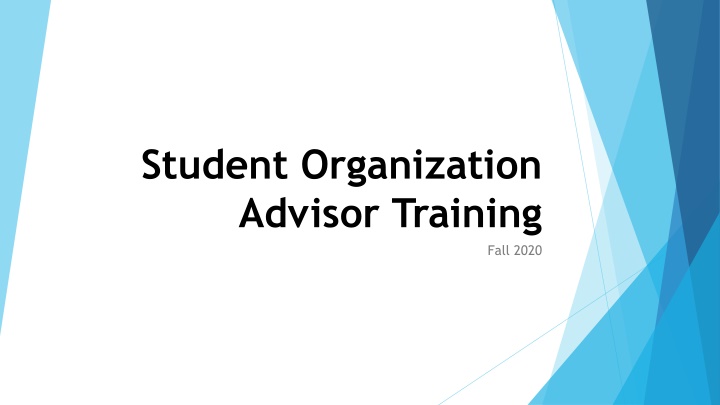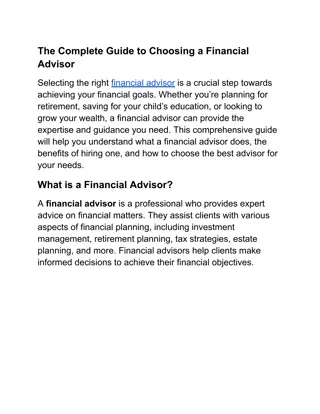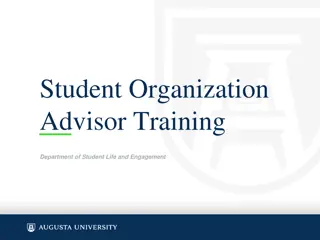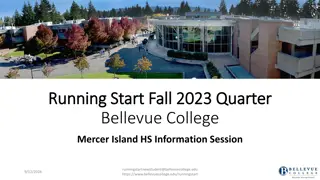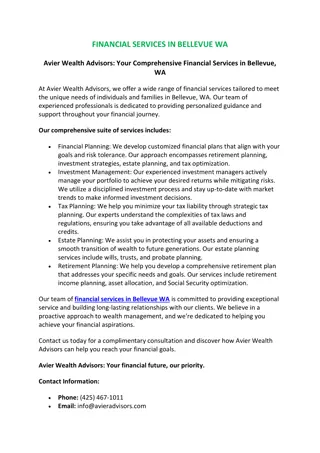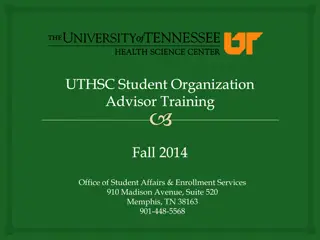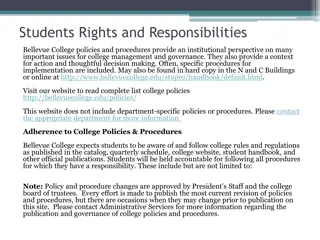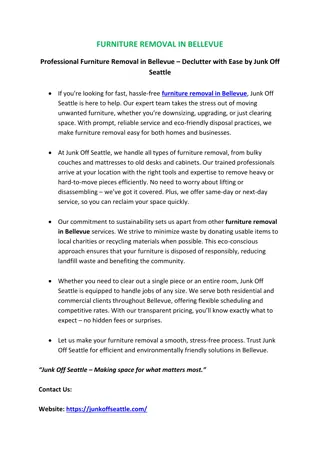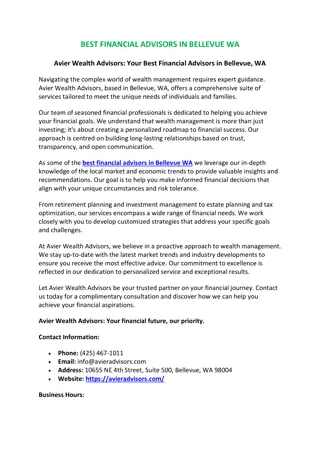Student Organization Advisor Training Fall 2020 at Bellevue College
As an advisor for a student organization at Bellevue College, you play a vital role in guiding and supporting students. This training program covers essential topics such as the role of student organizations, advising styles, campus protocols, and the resources available through the Office of Student Programs. By familiarizing yourself with these guidelines, you can enhance the student experience and facilitate student-led initiatives effectively.
Download Presentation

Please find below an Image/Link to download the presentation.
The content on the website is provided AS IS for your information and personal use only. It may not be sold, licensed, or shared on other websites without obtaining consent from the author.If you encounter any issues during the download, it is possible that the publisher has removed the file from their server.
You are allowed to download the files provided on this website for personal or commercial use, subject to the condition that they are used lawfully. All files are the property of their respective owners.
The content on the website is provided AS IS for your information and personal use only. It may not be sold, licensed, or shared on other websites without obtaining consent from the author.
E N D
Presentation Transcript
Student Organization Advisor Training Fall 2020
Introduction As an advisor for a student organization at Bellevue college, you are embarking on a great adventure with our students. We begin by thanking you for your dedication and hard work. All student organization advisors are faculty and staff who generously donate their time and energy to our student organizations. We appreciate everything that you do for our students!
Introduction In addition to this training, advisors should familiarize themselves with the protocols for student organizations. These are found in the Student Organization Handbook. Topics for today s orientation and training: What is a Student Organization at BC? Advising styles What Does the Office of Student Programs Do? Roles and Responsibilities Advisor s Role What does the ASG Do? Time Commitment and Expectations Working with the Office of Student Programs Campus Security Authority Training Emergency Protocols Assigned Student Programs Team Member Passing the Torch Tips for Success: the Do s and Don ts of Advising a Student Organization The NEW Student Organization Handbook Goals and Learning Outcomes Working with a Student Organization
What is a Student Organization at BC? A Student Organization is student-led and student-driven. Students set the agenda for what the group will do, manage the group s events and activities, run their own officer elections and set the goals for themselves. Becoming a Chartered Student Organization means that the org has access to support and College resources. The student org s advisor and the Office of Student Programs support student organizations through a student- development-centered approach that fosters learning and personal growth for involved students.
What is a Student Organization at BC? To be an official student organization at BC, student organizations must charter through ASG and the Office of Student Programs Student organizations at Bellevue College have no employment relationship with the College, as they do not have paid faculty or staff advisors, and student leadership positions are also voluntary. Other student groups on campus may have student leaders and be part of a recognized program which is overseen by a staff or faculty member, but these are not considered student organizations at BC.
What Does the Office of Student Programs Do? The Office of Student Programs provides an array of services to student organizations and to the study body of Bellevue College. Staff members plan and host Student Program events and activities for all BC students. Staff members also support Chartered Student Organizations, Student Affinity Coordinators, Associated Student Government and Campus Activities Board. Staff also oversee the Watchdog newspaper, the Bulldog Food Pantry (in conjunction with the Benefits Hub), the Student Business Center and more! We support student leaders and student organizations in the planning and execution of their events and activities. Our pledge to our students in that we will always do our best to make their great ideas happen and our job is to help students be successful.
What Does the Office of Student Programs Do? Our Mission and Vision: The Office of Student Programs is committed to enriching student life by providing engagement and leadership opportunities that empower our students to find their passion, build community, and grow to be better world citizens who contribute to a vibrant and diverse campus. We work to support students and student organizations, with the goal of creating an inclusive environment that promotes cultural awareness, inclusivity, personal accountability, and respect. By helping students learn about themselves and actively engage with others, we believe this enhances the overall college experience. We also provide events, activities and outlets for purposeful involvement with a student development-centered approach, with the commitment to foster student success academically, personally and professionally.
What Does the Associated Student Government of Bellevue College Do? The ASG per their Constitution, By-laws and Financial Code exercise oversight of all student organizations at Bellevue College. They have been in the past and will continue to be involved in supporting student organizations they oversee, as well as approve charters and work with student organizations seeking funding from ASG. As the governing body of all students at BC, all student organizations are under the ASG Board of Directors. The ASG works in concert with the Office of Student Programs which manages the administrative tasks and guidelines for how student organizations are run, plan events and incur expenses.
Working with the Office of Student Programs The Office of Student Programs and the Associated Student Government (ASG) oversee all Chartered Student Organizations (CSOs) at Bellevue College. Student organizations are supported by the ASG, and their assigned Student Programs Team Member - either the Student Involvement Specialist (SIS) or the Associate Director of Student Programs (ADSP) in Student Programs. The Office of Student Programs provides administrative support and guidance for CSOs. The Student Organization Handbook outlines protocols and practices that apply to student organizations under ASG and Student Programs.
Your Assigned Student Programs Team Member Every Chartered Student Organization is assigned a Student Programs professional team member. This team member is your main point of contact with the Office of Student Programs. You should contact this person directly for any assistance. This person works with other staff and departments on your behalf, and will ensure you receive training, assistance with Project Plans, Funding Requests, and event planning. The role of Student Programs team members is to advise, educate and assist with access to College resources and troubleshooting as students plan for events and activities. Student Programs team members will not plan your event, run your event for you, or do the heavy lifting to ensure your events happen BUT they will assist and support you and student leaders as you learn and go through the process of recruiting members, planning and executing events.
Your Assigned Student Programs Team Member Student Involvement Specialist Amanda Arboleda The SIS supervises the members of Campus Activities Board and is the main point of contact for all student organizations. The SIS (with ASG) oversees chartering, event planning support and resources for student organizations. The SIS also plans and executes events for the Office of Student Programs. Associate Director of Student Programs Nora Lance The ADSP supervises the seven Student Affinity Coordinators who are student employees of Bellevue College. She also supports the identity and cultural groups the Student Affinity Coordinators work with. The ADSP also plans and executes events for the Office of Student Programs.
Working with the Office of Student Programs The Director of Student Programs, Carrie M. Moore, M.A. oversees the professional staff and the functional areas under the Office of Student Programs, including the Watchdog, Bulldog Food Pantry, the LGBTQ Resource Center, Student Business Center and the Student Volunteer Center. The Director is also the co-advisor to ASG. The Budget Manager, Hristo (Chris Stoynov) processes contracts, travel requests, payments to vendors. Business Center Manager and ASG Co-Advisor, Amy McCrory directly oversees the Student Business Center, Volunteer Center, Bulldog Food Pantry. This position also supervises the student workers for those areas, and is co-advisor to the ASG.
Working with the Office of Student Programs The Watchdog Program Manager, Lisa Salkind sells advertising in the Watchdog and is the Watchdog liaison between the Watchdog and student organizations, ASG, Student Programs and the Student Affinity Coordinators. The Leadership Advisor, LaMeshia Reese-Taylor plans and presents leadership training and leadership development and engagement opportunities for all BC students. The Student Life Web and Social Media Specialist, Tess McMillan manages social media accounts for the Office of Student Programs and builds and maintains webpages. This person also conducts training and offers expertise to student organizations on web design and social media management.
The NEW Student Organization Handbook It is strongly recommended that you review the Handbook to get a good understanding of all the protocols and guidelines. https://www.bellevuecollege.edu/organizations/advisors/ The Handbook is designed for students who are running a student organization. It contains step by step instructions and guidelines for everything students (and their advisors!) need to know: Chartering Working with Student Programs Roles and Responsibilities Approval of Activities Planning and Hosting Events and Activities Promoting Events Managing Finances
Goals and Learning Outcomes Before outlining institutional responsibilities that all advisors share, we begin be talking about how important our advisors are in the larger context of the College s mission. Advisors play an important role in student development. As an advisor to a student organization, you help to enrich the college experience of all organization members, and those who attend their events and activities. This is all related to the College s Strategic Plan.
Goals and Learning Outcomes So, how does advising a student organization fit into the College s Core Values? Student Success: Focus on the student's experience to develop and promote support services/programs while growing, diversifying, and shaping our student body. Teaching & Learning Excellence: Develop an educational community of anti- bias learning that adapts its goals and principles to the specific needs of learners. College Life & Culture: Create positive learning environments that are safe, supportive, and engaging. Community Engagement & Enrichment: Partner with (local, regional, state, national, global) communities to enhance the social, economic, and cultural well-being of our campus.
Goals and Learning Outcomes Goal: To offer a diversity of co-curricular and extracurricular activities that enhance the student experience and complement the academic experience. How student organizations help achieve that goal: Student organizations and other student groups such as Associated Student Government, allow students with similar interests to contribute to student life at Bellevue College; gain transferable skills; promote school spirit and pride; and coordinate a wide range of social, recreational, educational, collaborative and community service activities and initiatives.
Goals and Learning Outcomes Most of you are familiar with learning outcomes when it comes to academics. If you are in Student Affairs, your area may have been working on OKRs last year In Student Programs, we have developed learning outcomes for students involved in student organizations. Keep these outcomes in mind as you work with your student leaders and organization members through the year: Student will be able to demonstrate growth in professional and leadership skills, including teamwork, fostering relationships, conflict resolution, ethical practice, time management and communication skills (written and verbal). Your student leaders may have additional outcomes for their organization.
Goals and Learning Outcomes As a student organization advisor, you help foster the culture of student engagement that leads to success in the classroom AND helps prepare students for careers after college. You are providing valuable professional development opportunities for your student leaders and group members, and help them feel connected to each other, the college, the BC community, the greater Bellevue community.
Working with a Student Organization How do you know if advising a Student Organization is right for you? The Student Involvement Specialist and the Director of Student Programs are happy to assist you. There s a lot to consider when thinking about being an advisor: How active will the student org be? Weekly meetings? Monthly? Do they want the advisor to attend all meetings (it is not required by Student Programs)? Do the member participate in lots of outdoor activities or other activities that may require an advisor to be present? Do you want to be more hands-on or just touch base a couple times a month?
Working with a Student Organization Any staff or faculty member can be an advisor. Most BC employees will need to get approval from their supervisor in order to serve if it will impact their work schedule. You do not have to be an expert in their field or from a certain cultural group. Student want and need a mentor, no experience required! Student Programs recommends the dual advisor model having two advisors shares the workload and the time commitment is lower. For example, there could be one advisor with whom the org officers meeting regularly to discuss new ideas, and another advisor who helps plan events or who assists with administrative tasks.
Working with a Student Organization Building the Relationship Building a rapport with student leaders takes time. Every advisor has their own style of advising, and it may take time to click with students. Set up regular meetings with your org s leadership team. Bring an agenda to discuss or questions that you may have. Remember open communication is the best way to avoid misunderstandings be responsive to requests, keep meeting appointments, and show student leaders appreciation for their hard work! Be honest about questions or concerns you have. You and student leaders may want to meet with your Student Programs Team Member together in order for everyone to be on the same page. If there is ever an issue, reach out to your Student Programs Team Member - we are here to help you be successful, and that means helping you and student leaders build a relationship of trust and mutual respect that will lead to more success for every student organization!
Working with a Student Organization Always remember: You are not the leader or supervisor of a student organization. You help support student leaders. You do not set expectations as to what the group does, or what their priorities are. The student leadership of the organization sets expectations and priorities with your input and guidance. Key is to help advise, mentor and help students grow personally and professionally. For example, if there is a cultural celebration that took place last year and a student org took the lead does not mean the new crop of officers are interested in leading this celebration. Too often in the past, student leaders have been told that the campus expects XXX to happen. Advisors may suggest and inform about past events, but the students should decide for themselves what they wish to do.
Advising Styles Whether you are new to advising student organizations, or a seasoned pro, take some time to examine your individual approach to advising. Remember that advising a student-run group is very different from advising and teaching students in an academic context, yet it still give us the opportunity to educate our students in different ways which complement academic endeavors. Advising a student organizations is also VERY different from supervising employees or running an organization yourself. Advisors are meant to guide, support and inspire not dictate priorities or assign tasks.
Advising Styles What s your advising style? Everyone has a different approach to advising student organizations Remember there is no right or wrong, and most people use a combination of approaches, depending on the student and the situation. Remember, no matter what you style is, you are not a supervisor you advise and guide but do not dictate, set the agenda, or tell students what events to do. Each advising approach is valid, and each one can be utilized to foster student development and success. Remember that the goal is to provide students with the opportunity to apply their knowledge acquired inside the classroom in a real-world context, and to help them gain and improve those valuable transferable skills.
Advising Styles There are three different approaches to advising which most advisors employ: Developmental Administrative Programmatic Tips for success: Always be mindful that students are coming to you at different stages of development. Spend time with your student leaders so that you may engage them on their level, and help them to develop their interpersonal and professional skills. Adapted from Advising Student Organizations: Next Practices, Danielle De Sawal, PhD, 2011, Indiana University
Advising Styles: Administrative Advising focuses on policies and budget concerns Task and goal-focused rather than process focused Ways to foster student development within an administrative approach: Learning to navigate policies, procedure and processes is a valuable skill is most fields. Talk through completing forms and documents. Assist students with understanding why these things are in place and why they are important.
Advising Styles: Programmatic Focuses on brainstorming, event planning and execution Overseeing the details of event planning for the organization and makes sure events happen. Advisors who take this approach often function more as active members of the group rather than advisors. Ways to foster student development with a programmatic approach: Provide guidance and options, but allow students to follow through. You must be willing to allow them to fail. Resist the urge to take over if student don t follow through
Advising Styles: Developmental Assist students with leadership development Guide students through the decision-making process, empower them to make decisions Rather than provide quick answers, develop decision making as a conversation. All students to fail. Using failure as an opportunity for growth and learning. EVERY moment is a teaching moment!
Advising Styles: Reflection Many advisors are more programmatic and administrative with a new group of student leaders, and then gradually pull back to being more developmental as students learn how to navigate college policies and what works (or doesn t work) when planning events. Remember: We set students up for success, but we must allow them to fail. Through failure, or even just things not going to plan, students learn and grow. Learning how to deal with a less than desirable outcome helps inform future planning and decision-making abilities.
Advising Styles: Reflection Take some time to reflect on your advising approach. What is your comfort level and how much time can you commit to? Remember there are not right or wrong ways to advise students. Most advisors choose the developmental approach, but most will use a combination of strategies. Strive to meet students at their level and work with them to develop skills. The end goal is to be intentional, regardless of your approach, in incorporating student learning into all your interactions with your student leaders and group members. Check yourself! If you feel students are dropping the ball and not following through with an event the campus expects step back and consider what the learning outcomes are, that students are always learning. And students take the lead in planning events and setting priorities not advisors. It can be very challenging, but don t stress!
Roles and Responsibilities Now that we have you (hopefully) thinking about your advising style, we move on to the advisor s institutional responsibilities. All student organizations are required to have at least one advisor who is a professional employee at Bellevue College either staff or faculty. Student organizations may choose their own advisor, and as long as the person chosen is a professional employee (staff or faculty) of BC and has permission (if needed) from their supervisor, they can choose to advise a student organization.
Roles and Responsibilities Complete this training provided by the Office of Student Programs. Complete Campus Security Authority training per Public Safety Comply with the college s policies and procedures, local, state and federal laws at all times. Comply with protocols outlined in the Student Programs Student Organization Handbook at all times when working with student organizations. Provide guidance and support to the student organization officers and members, and aid students in promoting the mission of their student organizations. Approve documents such as project plans before they are sent to Student Programs for processing. Keep the Student Involvement Specialist in Student Programs informed of any changes in the status of the group, officers or your status as advisor.
Roles and Responsibilities Be present OR designate another professional BC employee to be present for certain types of off-campus activities to ensure the safety of students. These include activities which would require a liability waiver, such as overnight travel, day trips, hiking, swimming, etc. Staff in the Office of Student Programs, in consultation with the Bellevue College Risk Committee and Public Safety, will determine if a BC employee needs to be present. If you designate another professional staff or faculty to attend the event, inform the Student Involvement Specialist or the Student Programs staff member assigned to your group before the event.
Roles and Responsibilities Be the professional point of contact OR designate another professional BC employee to be the point of contact for certain types of on-campus activities. This may include being the professional point of contact when Events/Dining Services is providing setup/food delivery/breakdown or other services. Please note that staff from the Office of Student Programs assist with some aspects of planning for events and activities presented by student organizations, but will NOT usually be present to manage the event or activity. If you designate another professional staff or faculty to be the point of contact, inform the Student Involvement Specialist or the Student Programs staff member assigned to your group before the event.
Roles and Responsibilities Mentor/Motivator: Involvement in the lives of students will mean they will seek career, academic, to personal advice. Be prepared to be a positive force of knowledgeable on various academic programs, resources, and services at the college. Have a good understanding of what services the college has to make referrals depending on student needs. The key is to demonstrate a genuine interest in the success of your students so they will continue to trust and respect you.
Roles and Responsibilities Team Builder/Conflict Mediator: A challenge of working with groups is the development and maintenance of individual and community needs. Your role is to help officers of the organization inspire the group to develop a shared vision and mission for the organization. The spectrum of personalities preset will create conflict and you will be needed to model a positive and open communication during contentious debates among group members.
Roles and Responsibilities Educator/Policy Interpreter: You will guide students in reflection of their actions, and be there to answer questions about policy, procedures, and expectations. You are to help students learn the skills to be self-sufficient and manage their own responsibilities using nudges, reminders, and structure for organizing and accountability.
Time Commitment Accepting the role of a Student Program s Advisor is a commitment that demonstrates dedication and passion for student success. The engagement within Student Programs provides advising and fosters trust through building a rapport among students. Some students may be beginning their first leadership role and will depend on guidance and mentorship from you as their advisor. The advisor operates within 3 quarters (fall, winter, and spring). Advising a student group should take on average 1 to 3 hours per week, with additional time when groups are hosting events or traveling. You can always designate another staff or faculty member to attend events or travel if you are not able to do so. Reach out to your Student Programs Team member for assistance.
Time Commitment Hours Activity Description Assisting the student program with annually setting goals and objectives, then helping to keep the group focused on tasks and activities they have chosen. Student Organization Meetings .5 Providing direction/interpretation to student organization leaders and organization members on college policy while assisting in understanding and utilizing processes and procedures within the college. Student Leadership Development .5 Providing support for students who manage the organization budget and preparation and submission of funding requests, payment requests, etc. Assisting with planning and implementing of events and activities. Attending meetings and activities involving the organization as necessary. 1 Budget Assistance Program Events Assistance 1
Campus Security Authority Training What is a Campus Security Authority? Who has to take the training? Why as an advisor you must take CSA training EVERY year The Office of Public Safety. Student Programs will assist with setting up training opportunities for advisors. Please note that as an advisor to a student organization at Bellevue College, federal law requires you to take CSA training on an annual basis
Emergency Protocols Student organization advisors and officers have a responsibility to report any incident involving violations of the BC Code of Student Conduct, injury, criminal activity or other incidents to the appropriate campus authorities and to the Director of the Office of Student Programs. In the event of an emergency, always Dial 911. Report incidents to Public Safety at 425-564-2400. Office of Student Conduct, https://www.bellevuecollege.edu/studentconduct/ Report ALL incidents to the Student Programs Team Member and the Director of Student Programs, carrie.m.moore@bellevuecollege.edu You may also submit anonymous reports and concerns to the BC CARE team: www.bellevuecollege.edu/reportconcerns
Passing the Torch Schedules and priorities may change quarter to quarter. Sometimes an advisor needs to step away from advising a student organization, and that is perfectly OK! Sometimes as the leadership in the student organization evolves, priorities and activities may change and a change in advisor may be considered. Students may at any time request to change their advisor and an advisor may at any time choose to step away from the group as well. The advising relationship in mutually agreed upon, which is why building that strong, positive working relationship is so important.
Passing the Torch When an advisor leaves an organization, the organization must find a new advisor and update the Office of Student Programs. If the organization is without an advisor, the student org s charter will be put on hold until Office of Student Programs receives the confirmation that a new advisor has been chosen. Whenever possible and appropriate, the outgoing advisor should assist in locating a new advisor. When applicable, the advisor should submit organizational records to the new advisor or the Student Involvement Specialist. An advisor may step away at any time. Suggestions for a replacement are welcome but not required. If you decide to step away, please contact your assigned Student Programs Team member. A student org that seeks a new advisor should first schedule a meeting with their assigned Student Programs Team Member.
Dos and Donts of Advising a Student Organization Do Encourage attendance at leadership training and provide students with resources for the training, such as ice breakers, important topics of discussion like values and ethics, ideas for downtime, etc. Allow the group to succeed, but remember that now is the time for them to learn from their mistakes. At the beginning, as well as periodically, be clear about the role of the advisor and your relationship to the organization. Be a sounding board for the organization. Assist the group in setting SMART goals (Specific, Measurable, Attainable, Relevant, and Timely) goals. Represent the group and its interests in staff and faculty meetings. Reach out to other advisors or departments for assistance.
Dos and Donts of Advising a Student Organization Do: Keep your sense of humor and enthusiasm. Share creative and alternative suggestions. Provide progressive feedback for activities planned by students. Learn what the students want to get out of the organization. Support them in their journey of accomplishing these goals. Ask officers to assist with procedural matters. Be knowledgeable of the organization s purpose and constitution, upcoming deadlines, ongoing goals, national, state, or regional expectations or bylaws, and help give feedback. Ask the executive board to orient new officers and members to the history and purpose of the group and help them to build upon it. Help members look toward the future by developing long-term goals and communicating those plans to future members.
Dos and Donts of Advising a Student Organization Don t: Be a Know it all Be the leader or run the meetings Manipulate the group, impose, or force your opinions on them Close communication Tell the group what to do, or do the work of the president or other members of the executive board Take ownership for the group, be the parent, or the smothering administrator Miss group meetings or functions which you have committed to attend
Dos and Donts of Advising a Student Organization Don t: Be afraid to let the group try new ideas Become such an advocate that you lose an objective viewpoint Allow the organization to become a one-person organization Be too laissez-faire or autocratic Assume the group handles everything satisfactorily and doesn t need you Assume the organization s attitudes, needs and personalities will remain the same year to year
